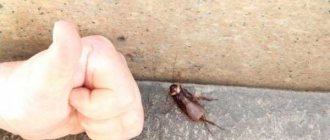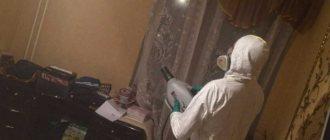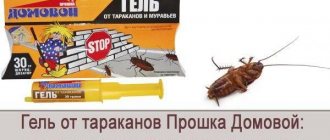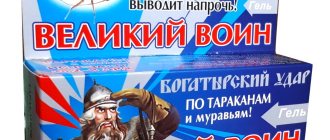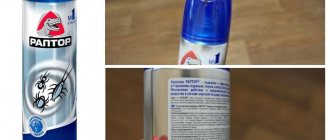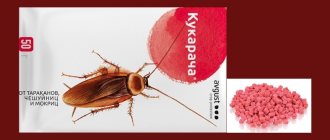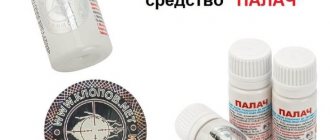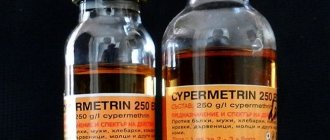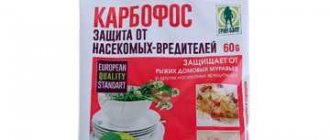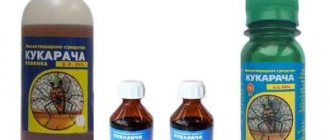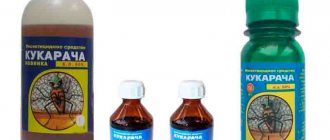Cucaracha occupies a worthy place among the insecticides sold on the market. The effectiveness of this product is guaranteed by the two insecticides it contains: cypermethrin 20% concentration and malathion 10% concentration. Insecticide - translated from Latin, a chemical preparation for the destruction of harmful insects. After all, once we find unexpected guests, we want to get rid of them as quickly as possible. Knowing that you won’t get anything good from them other than bites, irritation or allergies. In the forefront among insecticides is a drug with the exotic name “CUCARACHA”.
The effect of the drug and its composition
Cucarach's bedbug repellent is a potent insecticide, thanks to the two toxic substances it contains that interact together, destroying all parasites in the treated area.
Main active ingredients:
- Cypermethrin - makes up 20% of the volume of the drug, is a chemical poison of the pyrethroid type, which penetrates through the chitinous shell of the parasite into the digestive system, acts on nerve endings, blocking impulses, and causes paralysis of the limbs. The substance is not exposed to sunlight and high temperatures and retains its properties for 20-30 days. The main advantage of cypermethrin is the inability of bed bugs to develop resistance to the substance.
- Malathion (10%) is a nerve-paralytic insecticide that disrupts the production of nerve impulses, which leads to immobilization of the bug. This substance kills the parasite in a few seconds, although it is more volatile. With prolonged use, malathion can become addictive in parasites: their bodies produce enzymes that break down the poison. That is why it is used in combination with other toxic substances.
The effectiveness of Cucaracha is maximum within 3 days after treatment, which allows you to destroy all domestic bugs in an apartment or house during this time.
Cucaracha for bedbugs Cucaracha for bedbugs affects only adult individuals, but the substance is not capable of penetrating the durable shell of eggs; after a while, young larvae may emerge from them. Therefore, after the first treatment, it is not recommended to immediately wash off the drug from surfaces, and then re-spray after 10-14 days.
The product has a wide spectrum of action and can help fight not only bedbugs, but also ants, fleas, mosquitoes, cockroaches and flies.
On a note!
Cucaracha is a liquid substance of light blue or yellow color, produced in the form of an emulsion, and has a very unpleasant, pungent odor.
Instructions for use
We have already found out that Cucaracha is available in the form of a concentrated emulsion, which must be diluted with water according to the instructions. The finished bedbug repellent is not intended for storage. Therefore, it is worth first preparing the room for processing, and then proceeding with the production of the working composition.
At the stage of preparing the premises, you can involve family members and friends as assistants
Preparing the premises
First of all, children and all animals and plants must be removed from the house. If there are aquariums, terrariums and other artificial habitats, they also need to be taken out or carefully sealed. It is better if the treatment with a toxic drug is carried out by one person.
Treatment with a toxic agent should be carried out without assistants
We remember that after treatment you will not be able to enter the room for at least another day. Make sure that the other occupants of the home take everything they need with them.
And let's get started:
- We remove and pack all fabrics that can later be washed or disinfected by prolonged exposure to the cold: curtains, bedspreads, clothes, bed linen.
To disinfest fabrics from bedbugs, it is enough to wash them at a temperature of 60 ° C or keep them in the cold for 3 days - We remove or carefully seal remaining personal items, food and utensils.
For greater safety, you can put food in the refrigerator - We open access to all surfaces: remove carpets, move furniture, lay out sofas, remove mattresses from beds.
For proper disinfestation, it is necessary to provide access to all surfaces in the room. - Having freed the walls from paintings, clocks and other objects, we check the wallpaper for integrity. If the wallpaper has peeled off or cracked, it will have to be removed - it is precisely such cracks that become a favorite hiding place for pests.
Damaged wallpaper must be torn off the wall - We remove the baseboards.
Bedbugs often settle not only behind wallpaper, but also under baseboards - The room must be de-energized.
- We put on protective clothing, rubber gloves, goggles and a respirator.
It is unsafe to limit yourself to only a respirator, goggles and gloves. When working with toxic drugs, full protection must be ensured.
For protective clothing, you can use old heavy-duty trousers, a waterproof jacket with a hood, or a regular long-sleeved rain jacket.
Production of working composition
Cucaracha is intended for wide use against various types of pests. To kill bedbugs, the solution is prepared in a ratio of 2.5 milliliters of the drug per 1.0 liter of water.
To obtain the desired concentration of the working composition, it is necessary to maintain the correct proportions
To calculate how much working solution will be required for treatment, you need to take into account not only the volume of the apartment, but also the area of all other surfaces that need disinfestation. Calculations should include the fronts, sides and backs of cabinets, sofas and cushions, beds and mattresses. The average optimal consumption rate is 50 milliliters of the finished working composition per 1 square meter of surface.
To treat a hard surface, the finished composition is sprayed for 2–3 seconds
When making calculations, it is worth considering that wood is more hygroscopic than plastic. A double standard will be required for processing soft and fabric surfaces of furniture.
To prepare a solution from the emulsion we will need:
- Working container (bucket or other vessel of the required volume).
To prepare the working solution, a container made of neutral material is suitable: glass or enamel. - Wooden or plastic spatula for stirring.
The spatula or stick must be long enough to thoroughly and safely stir the solution. - Warm water.
The optimal water temperature for making the composition is slightly above room temperature: about 27–30 °C - Spray.
There are many types of special sprayers: you can use a professional one, but for a one-time treatment a regular one is also suitable
It is important to remember that not only the treatment of the premises, but also the production of the working composition should be carried out using protective equipment.
Step-by-step instruction:
- We heat the water for the solution slightly above room temperature: in warm water, the activity of the components of the substance increases.
You can heat all the water at once, or you can boil a small amount and add it to the working container to achieve the desired temperature - Pour half the calculated volume of water into the selected container, add the calculated amount of Cucaracha in full.
Before adding to water, the drug can be measured using a special measuring cup - Mix thoroughly with a prepared wooden or plastic spatula.
Instead of a special spoon or spatula, you can use a regular wooden stick for mixing. - Add the remaining water.
Water is added in two stages to ensure greater uniformity of the working composition. - Mix thoroughly again.
After repeated stirring, the working composition is ready for use. - Pour into the prepared spray bottle.
After pouring the composition into the spray bottle, you can begin treating the room.
Important: the water for the solution must not be overheated, otherwise the working composition will lose its effectiveness due to the premature evaporation of malathion (karbofos).
Room treatment
Most pests prefer to hide in dark and hard-to-reach corners of the home. Bedbugs are no exception. First of all, it is necessary to treat the most obvious areas of accumulation, especially those where parasites were visually observed.
Then you can begin to disinfect the remaining surfaces. The most scrupulous processing should be subjected to:
- Upholstered furniture. Pay special attention to cracks and folds.
If a room is heavily infested, bedbugs can hide not only in the folds, but also in the seams of upholstered furniture - Cracks and crevices in the floor, walls, baseboards, door frames and window frames.
Particular attention should be paid to the window sills and their lower part - Crevices, niches and recesses in ordinary furniture - with a strong infestation, bedbugs can settle in any darkened cavity.
In inaccessible places, pests are able to hide and reproduce for a long time - Ventilation holes and sockets.
When heavily infested, pests are able to take a liking to such unexpected places as electrical sockets, and even penetrate through them into neighboring apartments
Finally, the floors, walls and ceiling are treated.
After treating all the nooks and crannies, it’s time for a general disinfection of the room. Walls, floors and ceilings are treated over the entire surface area
During treatment, it is recommended to provide ventilation to the room: you can open the windows or create a draft in any other available way.
Actions after processing
After completing spraying, close all windows and doors tightly and leave the room. It is best to leave the treated areas for at least a day. Although, if necessary, you can begin further actions after 4–5 hours.
Upon returning, to get rid of toxic fumes in the room, it must be well ventilated.
First of all, you should open all windows and doors and, if possible, create a draft so that the poison is completely ventilated
Collect dead pests with a vacuum cleaner, pack them in a bag and burn them. You should not start wet cleaning earlier than a day later - this will reduce the effectiveness of the drug.
All actions after treatment should also be carried out using protective equipment to minimize the residual effect of the drug.
To completely neutralize the product for further safe living indoors, all surfaces must be washed with soap or soda solution. The alkaline environment effectively copes with residual effects after many types of chemical treatments.
To prepare a soap solution, it is better to use laundry soap rather than toilet soap.
If necessary, treatment with Cucaracha should be repeated. Repeated disinfestation is usually carried out after a week.
Precautionary measures
The composition of the drug Cucaracha contains toxic substances, therefore, when using the product, the following safety rules must be observed:
- Read the instructions carefully and follow the directions exactly.
It is better to study the instructions for use of the drug in advance in order to save yourself from unpleasant surprises during the treatment process - Children, animals, people with weakened immune systems, people prone to allergies and pregnant women should not come into contact with the drug and its components.
Children and animals should be completely protected from contact with Cucaracha and its components. - It should be remembered that when the product is inhaled, its toxic effect increases. It is strictly not recommended to lean towards the liquid, or allow it to come into contact with the skin or mucous membranes.
When thinking about a protective suit for pest control, don’t forget about shoe covers - While preparing the working solution and treating the room, you should not drink, eat or smoke - this increases the risk of toxic components entering the body.
You can have a snack in advance, or postpone eating until the disinfestation is complete. - Unused product residues are strictly prohibited from being poured into water bodies or sewers. They must be disposed of in accordance with toxic waste disposal regulations.
In case of accidental contact with the skin or mucous membranes, rinse the affected areas with water.
If the product does get on the skin, you should immediately wash it off with plenty of running water.
Symptoms of poisoning in case of individual intolerance to the components may include the following:
- Dizziness.
- Unpleasant taste in the mouth.
- Nausea.
- General discomfort.
- Headache.
- Unpleasant sensations or pain in the stomach.
- Signs of an allergic reaction.
If you notice at least one of the symptoms, you need to urgently go out into fresh air and take a sorbent. Activated carbon is considered one of the best remedies.
Activated carbon is easy to purchase at any pharmacy. It is advisable to always have it in your home medicine cabinet.
If symptoms do not disappear within 30–40 minutes, you should consult a doctor.
The shelf life of Cucaracha is 2 years. The container must be tightly sealed. The product should be stored away from children and pets, away from sunlight and heating appliances.
Cucaracha should be kept out of reach of children and pets.
Treatment areas and room preparation
Cucarach emulsion is most often used to treat:
- residential and industrial premises;
- kindergartens (except bedrooms) and other institutions;
- sanatoriums and tourist centers;
- canteens and other catering establishments.
Before you start spraying a room with Cucaracha against bedbugs, you need to prepare it as follows:
- Clothes and fabric items (curtains, tablecloths, etc.) should be packed and taken out of the room; they should be washed in hot water or treated with a steam generator.
- Inspect the wallpaper and tear off any loose parts, as bedbug nests may be located behind them.
- Remove food from the kitchen, take it out of the apartment or seal it in film, or put it in the refrigerator.
- Remove all residents and pets from the apartment, cover the aquarium with glass for a while, and turn off the compressor.
- Move furniture away from the walls.
- Take down all photographs, paintings and posters hanging on the wall.
- Close all windows and doors hermetically, turn off the electrical wiring.
- For the person who will process Cucarachi, prepare protective clothing (you can wear old unnecessary things that you wouldn’t mind throwing away), a respirator and goggles.
Preparation of solution for disinfestation
- The insecticide “CUCARACHA” is diluted in warm, but not hot water, this increases the volatility of the active substances, which means the product will act faster and more effectively.
- To obtain 1 liter of solution, 2.5 grams of the drug are required.
- A 50 ml bottle is enough to treat 70 squares.
- For 1 sq. per meter, approximately 50 ml of the finished emulsion is consumed. When treating a large number of absorbent surfaces (upholstery, carpets, etc.), the solution consumption increases to 100 ml per square meter.
- The prepared solution cannot be stored for a long time. It must be used immediately after preparation.
Before you start preparing the solution, you should study in detail the instructions for use of the drug “CUCARACHA”!
Where to buy the product and price
If Cucaracha is purchased for use against bedbugs in an apartment, then it is better to buy a small container of 25 or 50 ml, which will cost about 200 rubles. The drug is sold in hardware stores or you can place an order online.
A bottle with a capacity of 1 liter is purchased when treatment is required in institutions or multi-storey buildings; its price is about 1,500 rubles.
The product has several analogues:
- containing cypermethrin - Tetrix, Tsifox, Medilis;
- with malathion – Karbofos, Fufanon.
Cost and analogues
This product will cost 200 rubles for a 0.05 liter bottle. Large volumes, for example, 5 liters, have a price of about 6,500 rubles.
There are quite a lot of analogues on the market that have the same effect, for example, hector, delta zone, get. Their cost is an order of magnitude lower, but keep this point in mind, it’s a matter of volume and concentration. Therefore, cucaracha is an affordable and budget option.
Advantages and disadvantages of the product
Benefits of using Cucarachi against bedbugs:
- refers to highly effective means, used by professional services to destroy bedbugs, and you can also use it to poison bedbugs indoors;
- A fairly economical product, a small bottle is enough to spray an apartment or house;
- low cost, easy to purchase at a household chemical store;
- has good reviews from consumers;
- the active effect of the substance lasts 3-4 weeks; repeated treatment may not be necessary, since the hatched larvae will be poisoned by the substance remaining on the surfaces.
Is it dangerous for humans?
Speaking about safety for humans and animals, any pesticide is dangerous. This product has a hazard class of 3, it is not critical, but it cannot be called harmless. But it should be said that when it enters the human body it does not accumulate and is eliminated quite easily, as the manufacturer claims.
Also, the manufacturer, including specialists, emphasize that its use is only possible with the use of protective equipment!
If people who suffer from allergic reactions, asthma, or chronic respiratory diseases live in the room, it is not recommended to use the drug.
Manufacturer warns! Individual intolerance to the components is possible!
Compound
"Cucaracha" contains two active ingredients belonging to different classes of insecticides - cypermethrin and malathion.
Cypermethrin is a second generation pyrethroid, synthesized back in the 70s. However, despite its venerable age, this insecticide still remains one of the most popular both in home pest control and in the treatment of fields, gardens and vegetable gardens.
The composition of insecticidal preparations most often includes a “cocktail” of various isomers of cypermethrin. Each isomer has different properties, which makes cypermethrin insecticides very versatile and effective against any insect. In its pure form, this substance looks like a colorless liquid with small crystals floating inside and a characteristic odor. The poison enters the bug's body through the digestive system. Cypermethrin disrupts the functioning of so-called sodium channels - ion channels that allow the passage of sodium ions between cell membranes. Due to this, a powerful neuroparalytic effect is achieved, which leads to the death of the insect.
Cypermethrin is durable, stays on the treated surface for a long time and retains its toxic properties for up to two weeks. Depending on the concentration of cypermethrin, drugs based on it may belong to the 2nd and 3rd hazard classes.
The second active component of Cucarachi, malathion, was obtained even earlier than cypermethrin - in 1950. It was first synthesized in America, but two years later Soviet scientists managed to repeat the achievements of their American colleagues and create malathion in the Soviet Union. Pure malathion appears as a colorless, oily liquid with a pungent and unpleasant odor.
Once in the insect’s body, malathion is converted into its more toxic counterpart, malaoxone. Malaoxone destroys the enzyme acetylcholinesterase, which is involved in the transmission of nerve impulses. Thus, malathion in Cucarachi duplicates the nerve-paralytic effect of cypermethrin. Malathion-based drugs belong to the 3rd hazard class.
Security measures
As already mentioned, the product is dangerous, which means you should protect yourself and those living in the apartment as much as possible:
- The use of the product should be avoided if the following people live in the house: pregnant women, allergy sufferers, asthmatics.
- Prepare clothes that can be thrown away after the procedure. These should be pants and a long sleeve jacket. Be sure to use gloves, a respirator, safety glasses, and shoe covers.
- You need to work with the solution as carefully and carefully as possible. Avoid contact with skin and mucous membranes. When working, do not keep it close to your body or face.
- The solution that remains must not be poured into drains or sewers. You should call the specialized service and clarify the information.
Very important!
If you experience any symptoms, such as a taste in the mouth, dizziness, headache, nausea, stop using the drug immediately. Get some fresh air; if symptoms persist, be sure to consult a doctor.
How to use the product
To describe the treatment procedure in general terms, you should prepare a solution, pour it into a container with a spray bottle, apply it to the surface and wait for the result. But in fact, pest control requires time, effort and patience, this is the only way you can achieve results.
If you do not have experience in such procedures, the first thing to do is to carefully read the instructions. Remember two things, first - you are working with pesticides, second - exterminating pests is a very labor-intensive procedure.
The treatment of the premises will consist of several stages:
- Study of safety measures;
- Preparation of the solution;
- Preparing the premises;
- Treatment;
- Actions after processing.
Reviews about the product
Olga: “I live in a communal apartment. I struggled with bedbugs for a long time and to no avail. I bought Cucaracha. I ordered it online because it wasn’t available in our town. I did everything as indicated in the instructions, but I still got bedbugs. At first I was disappointed. And this time she missed. Then I disinfected it again and the bedbugs disappeared. One hundred percent effective!”
Ksenia: “I was poisoned by this cucaracha. Nausea, vomiting, weakness and dizziness appeared. I did the treatment in a gauze mask, but I needed a respirator or gas mask. I don’t know how it affects others, but I almost died along with the bedbugs. Read the instructions carefully and do not neglect protective equipment. The bedbugs have disappeared. The smell lasted for almost two weeks after using the product. I did some general cleaning and cosmetic repairs!”
Alexander: “I decided to quickly get rid of harmful animals. I searched through information on the Internet about all the remedies against bedbugs. Stopped at Cucarach. I was attracted by the price, economical consumption and promised efficiency. The expectations were justified. There are no parasites to be seen for six months. Fast and efficient. He worked in overalls and a respirator. I now recommend it to everyone!”
Cucaracha for bedbugs: reviews
Since 5 different remedies for bedbugs and other insects are produced under the name Cucaracha, when reading reviews online, pay attention to which particular drug we are talking about.
Irina K.
Friends gave us the sofa, my husband brought it to our home. When they decided to clean it, they pulled out the drawers, and there were bedbugs. We bought cucaracha in spray at the nearest store at home at random. It’s convenient to spray, nothing leaks, the sprayer works until the last drops on the bottom, one bubble was enough for the sofa. I don’t know exactly what helped – picking up the bedbugs with a vacuum cleaner or the remedy, but the story didn’t continue, the bedbugs disappeared, although at first they even thought of throwing out the sofa.
Vitaly Chomsky
I ordered the treatment of cabins at the SES; I needed something simple, trouble-free and inexpensive. It was Kukarachy who were being processed. I didn’t go into details, but for several months no one complained that the bedbugs were biting again. The stink—it stank horribly at first, but either everyone there got used to it quickly, or it dissipated quickly.
These reviews were received from Dez Group clients who tried to use Cucaracha themselves or ordered pest control from SES services. If you also had to use the Cucaracha product or had it professionally treated, you can leave your review of the drug at the bottom of the page using the “Add a comment” form. In the text, be sure to specify which insecticide with the name Cucaracha you are talking about.
Which areas should be treated with Cucaracha?
First of all, places where a large concentration of insects is suspected can be treated.
Should be carefully processed:
- bottom surfaces of mattresses;
- back walls of sofas, armchairs, sideboards;
- cracks in the walls and floors, baseboards, holes;
- carpets, frames, photographs, tapestries that hang on the walls. It is worth treating their back surface.
After carefully treating the room, you should leave it for three to four hours. Then you need to open the windows and doors and ventilate the room well. Surfaces in the apartment should be washed with soap and water so that the poison does not remain on them.
It will not be possible to remove all bedbugs during the first baiting. Therefore, after two weeks the procedure will have to be repeated. If this is not done, new bugs will appear that were originally in the eggs. It’s better not to be lazy and treat all hard-to-reach places, because these are where insects like to accumulate.
How dangerous is it for people and animals?
How dangerous a drug can be for the health of a person or animal depends on how long the person inhaled the vapors of the substance, whether the substance came into contact with the skin or mucous membranes, as well as on individual intolerance to specific components.
- If the diluted emulsion gets on the skin, nothing bad will happen.
- If the substance comes into contact with the skin in large quantities, mild itching and redness may occur.
- Inhalation of solution vapors outside of spraying may cause mild cramps and sore throat. No negative effects on the respiratory system were detected.
- If the drug is swallowed or gets into the eyes or mucous membranes, urgent rinsing . The drug belongs to the third, moderately dangerous class of chemicals.
- Inhalation of the solution from the spray can cause serious harm to the respiratory system and overall health.
Attention! Persons under 18 years of age, pregnant women and people with asthma are not allowed to perform pest control work.
